2019-2020年高中英语 Unit3 Under the sea Period 3优秀教案 新人教版选修7
- 格式:doc
- 大小:37.00 KB
- 文档页数:6
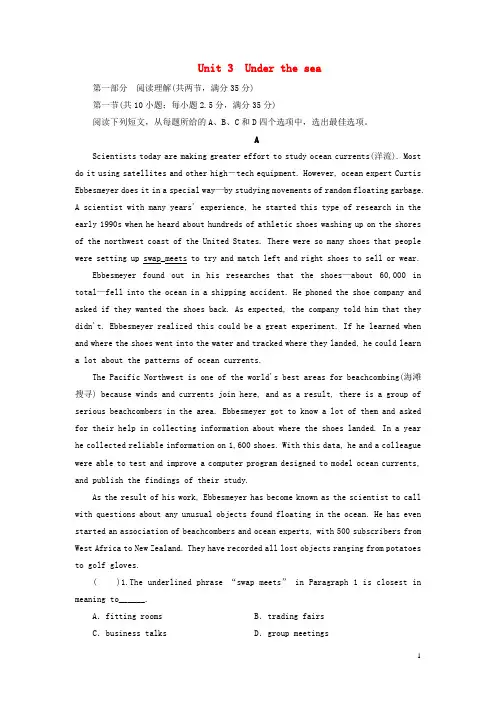
Unit 3 Under the sea第一部分阅读理解(共两节,满分35分)第一节(共10小题;每小题2.5分,满分35分)阅读下列短文,从每题所给的A、B、C和D四个选项中,选出最佳选项。
AScientists today are making greater effort to study ocean currents(洋流). Most do it using satellites and other high-tech equipment. However, ocean expert Curtis Ebbesmeyer does it in a special way—by studying movements of random floating garbage.A scientist with many years' experience, he started this type of research in the early 1990s when he heard about hundreds of athletic shoes washing up on the shores of the northwest coast of the United States. There were so many shoes that people were setting up swap_meets to try and match left and right shoes to sell or wear.Ebbesmeyer found out in his researches that the shoes—about 60,000 in total—fell into the ocean in a shipping accident. He phoned the shoe company and asked if they wanted the shoes back. As expected, the company told him that they didn't. Ebbesmeyer realized this could be a great experiment. If he learned when and where the shoes went into the water and tracked where they landed, he could learn a lot about the patterns of ocean currents.The Pacific Northwest is one of the world's best areas for beachcombing(海滩搜寻) because winds and currents join here, and as a result, there is a group of serious beachcombers in the area. Ebbesmeyer got to know a lot of them and asked for their help in collecting information about where the shoes landed. In a year he collected reliable information on 1,600 shoes. With this data, he and a colleague were able to test and improve a computer program designed to model ocean currents, and publish the findings of their study.As the result of his work, Ebbesmeyer has become known as the scientist to call with questions about any unusual objects found floating in the ocean. He has even started an association of beachcombers and ocean experts, with 500 subscribers from West Africa to New Zealand. They have recorded all lost objects ranging from potatoes to golf gloves.( )1.The underlined phrase “swap meets” in Paragraph 1 is closest in meaning to______.A.fitting rooms B.trading fairsC.business talks D.group meetings( )2.Ebbesmeyer phoned the shoe company to find out______.A.what caused the shipping accidentB.when and where the shoes went missingC.whether it was all right to use their shoesD.how much they lost in the shipping accident( )3.How did Ebbesmeyer prove his assumption?A.By collecting information from beachcombers.B.By studying the shoes found by beachcombers.C.By searching the Web for ocean currents models.D.By researching ocean currents data in the library.( )4.What is the purpose of the author in writing this passage?A.To call people's attention to ocean pollution.B.To warn people of shipping safety in the ocean.C.To explain a unique way of studying ocean currents.D.To give tips on how to search for lost objects on the beach.本篇为科普说明文。
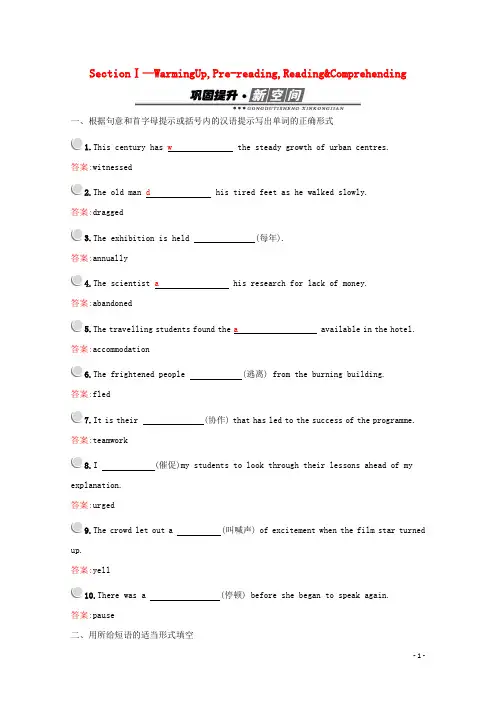
SectionⅠ—WarmingUp,Pre-reading,Reading&Comprehending一、根据句意和首字母提示或括号内的汉语提示写出单词的正确形式1.This century has w the steady growth of urban centres.答案:witnessed2.The old man d his tired feet as he walked slowly.答案:dragged3.The exhibition is held (每年).答案:annually4.The scientist a his research for lack of money.答案:abandoned5.The travelling students found the a available in the hotel. 答案:accommodation6.The frightened people (逃离) from the burning building.答案:fled7.It is their (协作) that has led to the success of the programme. 答案:teamwork8.I (催促)my students to look through their lessons ahead of my explanation.答案:urged9.The crowd let out a (叫喊声) of excitement when the film star turned up.答案:yell10.There was a (停顿) before she began to speak again.答案:pause二、用所给短语的适当形式填空sort out help out ahead of even though be about to wash off witness...with one’s own eyes point toward1.We leave when somebody rang the doorbell.答案:were about to2.it rains,the footballers are still going to play the game.答案:Even though3.There were three women waiting him in the queue.答案:ahead of4.Jane is her friend by lending him her car.答案:helping out5.John a house,saying that was his home.答案:pointed toward6.I won’t believe it unless I .答案:witness it with my own eyes7.The man suddenly fell over,and his suitcase was the board. 答案:washed off8.I’ll need time to the office staff—they are hopelessly disorganized at the moment.答案:sort out三、用所给单词的适当形式完成文章witness accommodation opposite teamwork depth yell drag urge pause abandonOne night,I was walking toward my 1. when I heard somebody 2. out,“Help!Help!”I saw a boy was trapped into a hole which was about 4 metres in 3..I realized that it needed 4. to save the boy.But howcould I find someone else?I was the only 5. and my cellphone was out of order.Looking at the poor boy,I didn’t want to 6. him,so I 7.him to hold on.Without a 8.,I went to the nearest shop and made a call to the police station.The boy was 9. out.Standing 10.me,the boy thanked me with tears in his eyes.答案:1.accommodation 2.yelling 3.depth 4.teamwork5.witness6.abandon7.urged8.pause9.dragged 10.opposite★四、阅读理解ASwimming along a river in western Florida,a newborn manatee(海牛)calls out for her mother.But the baby hears no answer.The mother has disappeared,possibly frightened away by a passing motorboat.Longing for her mom’s gentle touch,the confused manatee begins rubbing against the closest big thing she can find—a boat.From his home beside the river,Richard Dash sees the manatee rubbing against the boat.He keeps watch on the animal,hoping the mother will appear.But after two hours,she’s still alone.Dash calls the Florida Fish and Wildlife Conservation Commission for help.“A baby manatee needs its mother to show it where to find food,” says Andrew Garrett,a rescue coordinator(协调员)at the organization.Without a mother’s guidance,chances of survival are pretty much zero.A rescue team rushes to the scene to catch the newborn manatee,and then takes off for the rehabilitation(康复)centre at Lowry Park Zoo.After arriving at the centre,the manatee is given a checkup by the workers.The doctor’s exam shows that the manatee,now named Kee,is dangerously underweight.At less than 50 pounds,she’s one of the smallest orphans(失去生母的幼小动物)ever treated at the zoo.The baby is placed in a pool where the workers give her 24-hour care.Gradually Kee puts on pounds and gains strength.A few weeks later,an adult manatee recovering at the centre from an accident has a baby.This gives animal care manager Virginia Edmonds an idea.She decides to introduce Kee to the new mom,named Della.Edmonds hopes that Della will raise Keealongside her own baby,Pal.So the workers place the three manatees in the same pool.Within hours Della is nursing Kee with her milk.Soon Kee is getting all of her food from Della.1.The manatee described in Paragraph 1 is in a state of .A.angerB.puzzlementC.excitementD.disappointment答案:B解析:推理判断题。
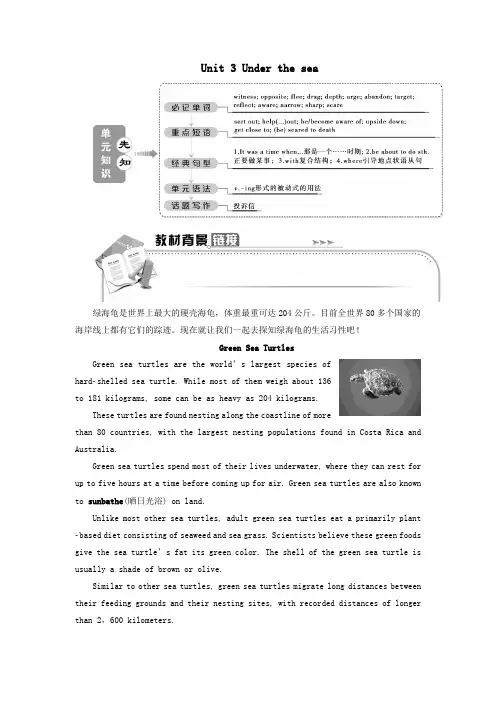
Unit 3 Under the sea绿海龟是世界上最大的硬壳海龟,体重最重可达204公斤。
目前全世界80多个国家的海岸线上都有它们的踪迹。
现在就让我们一起去探知绿海龟的生活习性吧!Green Sea TurtlesGreen sea turtles are the world’s largest species ofhardshelled sea turtle. While most of them weigh about 136to 181 kilograms, some can be as heavy as 204 kilograms.These turtles are found nesting along the coastline of morethan 80 countries, with the largest nesting populations found in Costa Rica and Australia.Green sea turtles spend most of their lives underwater, where they can rest for up to five hours at a time before coming up for air. Green sea turtles are also known to sunbathe(晒日光浴) on land.Unlike most other sea turtles, adult green sea turtles eat a primarily plant based diet consisting of seaweed and sea grass. Scientists believe these green foods give the sea turtle’s fat its green color. The shell of the green sea turtle is usually a shade of brown or olive.Similar to other sea turtles, green sea turtles migrate long distances between their feeding grounds and their nesting sites, with recorded distances of longer than 2,600 kilometers.Female green sea turtles leave the water in order to lay eggs on the beach and will choose the same nesting spot as where they were born. A female will dig out a nest and lay about 115 eggs. Then she’ll cover the eggs with sand and return to the sea. After about two months, the babies will hatch(孵化) from their eggs.The first few years of a green sea turtle’s life are spent floating at sea, where they feed on plankton(浮游生物). As they grow older, the turtles move to waters along the coast where they find sea grass to eat.Adult green sea turtles face many threats, primarily from humans, including injuries from boats, being caught in fishing nets and pollution. Newly hatched sea turtles are also at risk of being hunted by animals such as birds, crabs, and raccoons as they move from their nests out to the sea.Section ⅠWarming Up & Reading—Comprehending重点单词写作词汇1.witness vt. 当场见到;目击n. 目击者;证人;证据2.opposite prep. 在……对面adj. 相对的;相反的3.pause vi.& n. 暂停;中止4.teamwork n.协作;配合5.relationship n.关系;血缘关系;交往6.urge vt. 催促;极力主张;驱策7.meantime adv. 其间;同时拓展词汇8.annual adj.每年的;按年度计算的n.年刊;年鉴→annually adv.每年;一年一度地9.accommodation n.住所;住宿→accommodate vt.提供住宿10.flee vi.逃避;逃跑vt.逃离→fled(过去式)→fled(过去分词)11.drag vt.拖;拉;扯→dragged(过去分词)→dragging(现在分词)12.depth n.深(度);深处→deep adj.深的→deepen v.加深13.abandon vt.放弃;遗弃;抛弃→abandoned adj.被遗弃的;放纵的14.conservation n.保存;保护→conserve v.保存阅读词汇15.anecdote n.轶事;奇闻16.shore n. 岸;海滨17.yell vi. 大叫;呼喊n. 叫声;喊声18.dive vi.& n.跳水(的动作);潜水(的动作);俯冲19.harpoon n. (捕鲸用的)鱼叉20.shark n. 鲨鱼重点短语1.at the beginning of 在……开始时2.hear of/about 听说3.sort out 整理4.ahead of 在……前面5.race after 追赶6.in the meantime 在此期间;与此同时7.hold up 举起8.help (...) out 帮助(某人)摆脱困境或危难重点句型1.It was a time when...那是一个……时期:It was a time when(那是一个……时期) the killer whales, or “killers” as they were then called, helped the whalers catch the baleen whales that were on their annual migration.2.be about to do sth.正要做某事:This was the call that announced there was about to be a whale hunt(猎鲸行动马上就要开始).3.see sb.being done看到某人正在被……:It took over half an hour to get the boat back to James, and when we approached him, I saw James being firmly held up in the water by Old Tom(看到老汤姆正在水中稳稳地托着詹姆斯).ⅠFastreadingSkim the text and answer the following question.The text is mainly about ________.A.the killer whales are easily trainedB.the killer whales can help the whalers catch the huge whalesC.the killer whales kill the whales for their foodD.the killer whales drag the whales under the water答案:BⅡCarefulreadingRead the text carefully and choose the best answer.1.What happened to James after he was washed off the boat?A.He got hurt by a shark.B.He was abandoned by the other whalers and felt terrified.C.He dropped his hope and was nearly dying.D.He was held up in the water by Old Tom and rescued.2.Why did George beat the water with his oar?A.To frighten the whales away.B.To call back Old Tom to lead the way.C.To attract the attention of huge whales.D.To send signals to other whales.3.We can infer from the text that ________.A.the killer whales may be trained by the whalersB.the killer whales want to help man catch the whales themselvesC.the killer whales need no training for helping the whalersD.the killer whales want to eat the whales after killing them4.What does the word “it” in the sentence “He let it go and the harpoon hit the spot.” refer to?A.The whale. B.The boat.C.The harpoon. D.The killer.答案:1-4.DBACⅢStudyreadingAnalyze the following difficult sentences in the text.1.On the afternoon I arrived at the station, as I was sorting out my accommodation, I heard a loud noise coming from the bay.①本句是一个主从复合句。
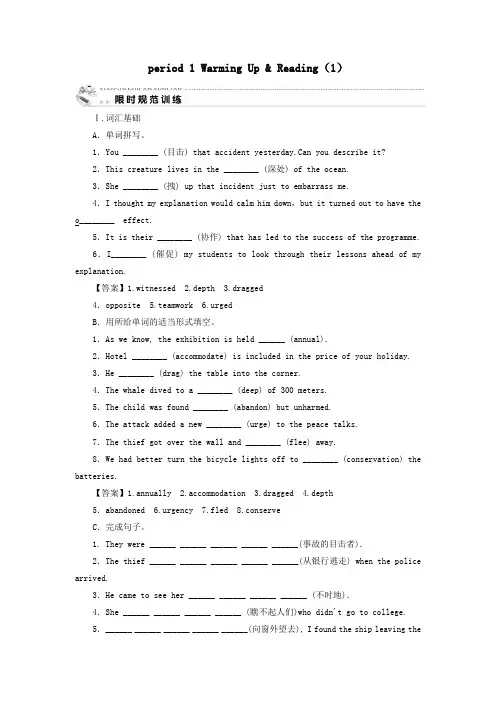
period 1 Warming Up & Reading(1)Ⅰ.词汇基础A.单词拼写。
1.You ________ (目击) that accident yesterday.Can you describe it?2.This creature lives in the ________ (深处) of the ocean.3.She ________ (拽) up that incident just to embarrass me.4.I thought my explanation would calm him down,but it turned out to have the o________ effect.5.It is their ________ (协作) that has led to the success of the programme.6.I________ (催促) my students to look through their lessons ahead of my explanation.【答案】1.witnessed 2.depth 3.dragged4.opposite 5.teamwork 6.urgedB.用所给单词的适当形式填空。
1.As we know, the exhibition is held ______ (annual).2.Hotel ________ (accommodate) is included in the price of your holiday.3.He ________ (drag) the table into the corner.4.The whale dived to a ________ (deep) of 300 meters.5.The child was found ________ (abandon) but unharmed.6.The attack added a new ________ (urge) to the peace talks.7.The thief got over the wall and ________ (flee) away.8.We had better turn the bicycle lights off to ________ (conservation) the batteries.【答案】1.annually 2.accommodation 3.dragged 4.depth5.abandoned 6.urgency 7.fled 8.conserveC.完成句子。
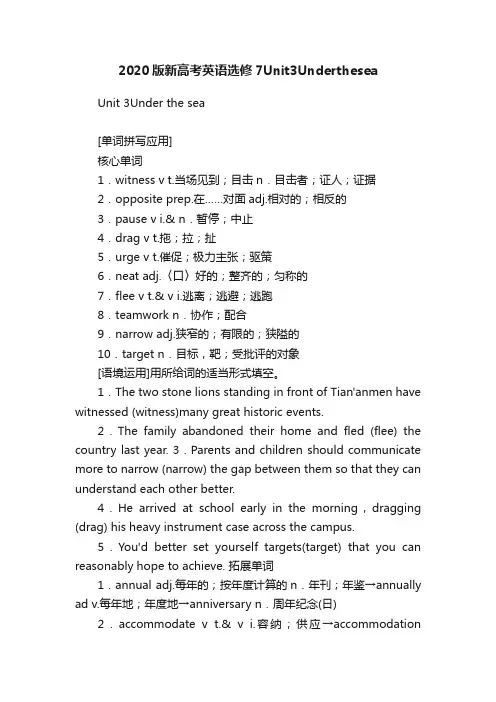
2020版新高考英语选修7Unit3Underthesea Unit 3Under the sea[单词拼写应用]核心单词1.witness v t.当场见到;目击n.目击者;证人;证据2.opposite prep.在……对面adj.相对的;相反的3.pause v i.& n.暂停;中止4.drag v t.拖;拉;扯5.urge v t.催促;极力主张;驱策6.neat adj.〈口〉好的;整齐的;匀称的7.flee v t.& v i.逃离;逃避;逃跑8.teamwork n.协作;配合9.narrow adj.狭窄的;有限的;狭隘的10.target n.目标,靶;受批评的对象[语境运用]用所给词的适当形式填空。
1.The two stone lions standing in front of Tian'anmen have witnessed (witness)many great historic events.2.The family abandoned their home and fled (flee) the country last year. 3.Parents and children should communicate more to narrow (narrow) the gap between them so that they can understand each other better.4.He arrived at school early in the morning,dragging (drag) his heavy instrument case across the campus.5.You'd better set yourself targets(target) that you can reasonably hope to achieve. 拓展单词1.annual adj.每年的;按年度计算的n.年刊;年鉴→annually ad v.每年地;年度地→anniversary n.周年纪念(日)2.accommodate v t.& v i.容纳;供应→accomm odationn.住所;住宿3.deep adj.& ad v.深深的(地)→deeply ad v.深深地→deepen v t.& v i.使加深;使强烈;变深;变低沉→depth n.深(度);深处4.abandon v t.放弃;遗弃;抛弃→abandoned adj.放纵的;堕落的5.reflect v t.& v i.反射;思考→reflection n.反射;沉思6.pure adj.纯粹的;纯洁的→purely ad v.纯粹地;完全地7.aware adj.意识到的;知道的→awareness n.意识8.vivid adj.生动的;鲜明的;鲜艳的→vividly ad v.生动地9.sharp adj.锐利的;锋利的;敏捷的→sharpen v t.& v i.削尖;磨快;尖锐;变锋利→sharpener n.卷笔刀10.taste v.& n.品尝;尝起来;味道→tasty adj.好吃的;可口的→tasteless adj.无味的11.scare v t.& v i.恐吓;受惊吓→scared adj.恐惧的;害怕的→scary adj.引起恐慌的12.relate v.使有联系;叙述;涉及→related adj.有关系的;有关联的→relation n.关系;叙述→relationship n.关系;血缘关系;交往[语境运用]用所给词的适当形式填空。
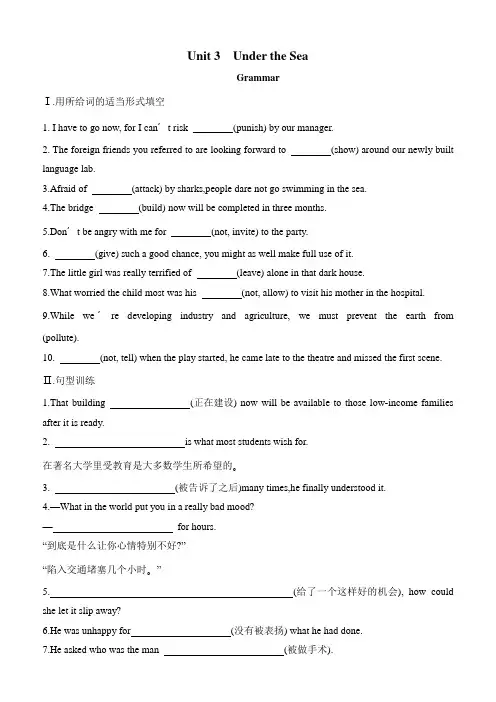
Unit 3Under the SeaGrammarⅠ.用所给词的适当形式填空1. I have to go now, for I can’t risk (punish) by our manager.2. The foreign friends you referred to are looking forward to (show) around our newly built language lab.3.Afraid of (attack) by sharks,people dare not go swimming in the sea.4.The bridge (build) now will be completed in three months.5.Don’t be angry with me for (not, invite) to the party.6. (give) such a good chance, you might as well make full use of it.7.The little girl was really terrified of (leave) alone in that dark house.8.What worried the child most was his (not, allow) to visit his mother in the hospital.9.While we’re developing industry and agriculture, we must prevent the earth from (pollute).10. (not, tell) when the play started, he came late to the theatre and missed the first scene. Ⅱ.句型训练1.That building (正在建设) now will be available to those low-income families after it is ready.2. is what most students wish for.在著名大学里受教育是大多数学生所希望的。
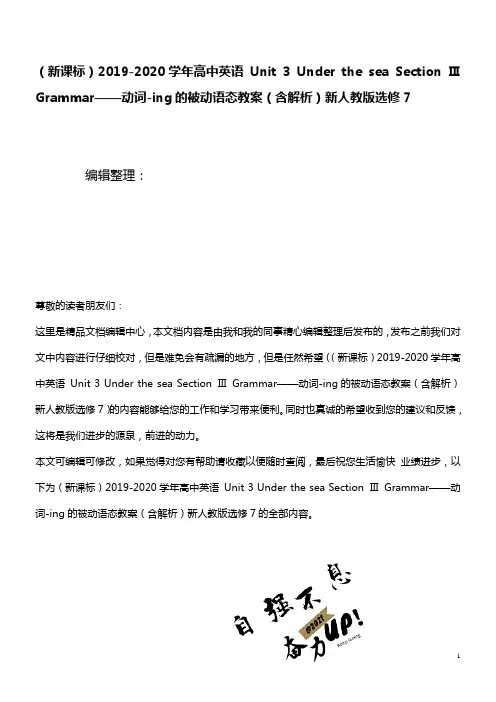
(新课标)2019-2020学年高中英语Unit 3 Under the sea Section ⅢGrammar——动词-ing的被动语态教案(含解析)新人教版选修7编辑整理:尊敬的读者朋友们:这里是精品文档编辑中心,本文档内容是由我和我的同事精心编辑整理后发布的,发布之前我们对文中内容进行仔细校对,但是难免会有疏漏的地方,但是任然希望((新课标)2019-2020学年高中英语Unit 3 Under the sea Section ⅢGrammar——动词-ing的被动语态教案(含解析)新人教版选修7)的内容能够给您的工作和学习带来便利。
同时也真诚的希望收到您的建议和反馈,这将是我们进步的源泉,前进的动力。
本文可编辑可修改,如果觉得对您有帮助请收藏以便随时查阅,最后祝您生活愉快业绩进步,以下为(新课标)2019-2020学年高中英语Unit 3 Under the sea Section ⅢGrammar——动词-ing的被动语态教案(含解析)新人教版选修7的全部内容。
Section ⅢGrammar-—动词.ing的被动语态语境自主领悟先观察原句1.I had already heard that George didn't like being kept waiting,so even thoughI didn't have the right clothes on,I raced after him。
2.As we drew closer,I could see a whale being attacked by a pack of about six other killers。
3.Being badly wounded,the whale soon died。
4.From James's face,I could see he was terrified of being abandoned by us。
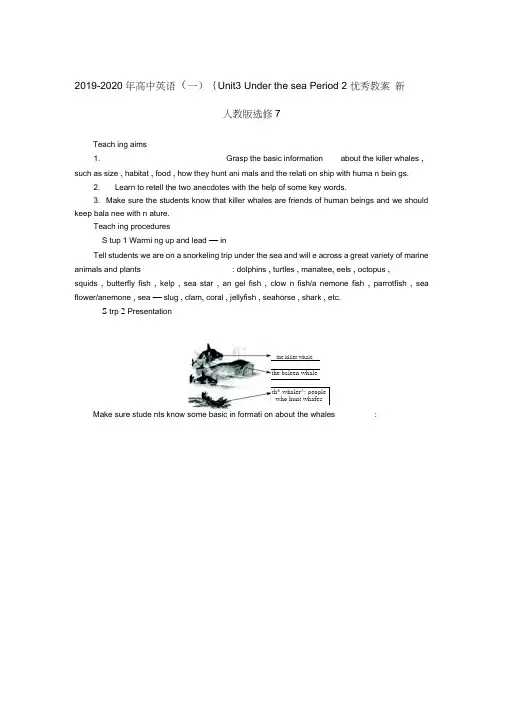
2019-2020 年高中英语(一){Unit3 Under the sea Period 2 优秀教案新人教版选修7Teach ing aims1. Grasp the basic information about the killer whales , such as size , habitat , food , how they hunt ani mals and the relati on ship with huma n bein gs.2. Learn to retell the two anecdotes with the help of some key words.3. Make sure the students know that killer whales are friends of human beings and we should keep bala nee with n ature.Teach ing proceduresS tup 1 Warmi ng up and lead —inTell students we are on a snorkeling trip under the sea and will e across a great variety of marine animals and plants : dolphins , turtles , manatee, eels , octopus ,squids , butterfly fish , kelp , sea star , an gel fish , clow n fish/a nemone fish , parrotfish , sea flower/anemone , sea —slug , clam, coral , jellyfish , seahorse , shark , etc.S trp 2 Presentationthe killer whalethe baleen whaleth* whaler^: peoplewho hunt whafesMake sure stude nts know some basic in formati on about the whales :Backgro und in formati onwriter Cla ncycareer a whalerwriting style an ecdotestime at the begi nning of the 20th cen turyplace Australiamain character whalers , killer whales , the baleen whalesthe killer whales help the whalers to kill a baleen whale main ideaStep 3 SkimmingAsk stude nts to skim the passage quickly and an swer the questi onsWhat is the first anecdote about ? And how about the second one?The first an ecdote mainly talks about that _____ .A. Clancy began to work at a whaling stationB. the killer whales helped the whalers to catch a baleen whaleC. the killer whales hunted in a team and killed a baleen whaleD. Old Tom showed whalers the way to a baleen whaleKey: BThe second anecdote : Old Tom saved a whaler James who was washed off the boat.S trp 4 ScanningFill in the follow ing bla nks with the proper n ames :1. ______ was 16 years of age when he went to work at the whaling station.2. ______ ordered Clancy to go to the boat as there was a whale out there in the bay.3. _____ was swimming by the boat , showing the whalers the way.4. _____ told Clancy that they would return the next day to bring in the bodyof the whale.5. _____ was carried by the waves further away from the whalers.6. _____ knew that Old Tom would protect James.Keys:1.Cla ncy 2.George 3.Old Tom 4.Jack 5.James 6.RedSlep 5 Careful readingStory Part 1the hunt—*■ afterduringAsk students to read Part 1 of the reading passage and find out before the hunt , what did Old Tom do and how did the whalers react?Suggested answers : Old Tomthrew itself out of the water , then crashed down again and swam by the boat , showing the whalers the way.One whaler yelled out and George ran ahead of clancy.Clancy raced after him.They jumped into the boat with the other whalers and headed out into the bay.Next, find out during the hunt and after the hunt , what did the killer whalesdo and how did the whalers react?Suggested answers : A pack of killers are throwing themselves on top of the whale's blow —hole to stop it breathing ;and some others are stopping it fleeing out tosea.The killers started racing between the whalers' boat and the whale just like a pack of excited dogs.Within a moment or two , the whale's body was dragged downinto the depths of the sea.The man in the bow of the boat aimed the harpo on at the whale and the n let it go to hit the spot.Ask stude nts to read Part 1 of the readi ng passage aga in and put the follow ing sentences into the correct order :a. George started beating the water with his oar.b. Clancy raced after George to the boat.c. Clancy arrived at the whaling station.d. The killers started racing between our boat and the whale.e. Clancy heard a huge noise ing from the bay.f. Clancy was sorting out his acmodation.g. Clancy ran down to the shore.h. The man in the bow of the boat aimed the harpoon at the whale.Keys:cfegbadhStory Part 2Which was NOT the dan ger facing James?A. Being washed off the boat.B. Being carried away by rough waves.C. A shark out there.D. Being attacked by another killer whale.Key: DStep 6 prehending1. The text is mainly about ______ .A. the killer whales are easily trainedB. the killer whales can help the whalers catch the huge whalesC. the killer whales kill the whales for their foodD. the killer whales drag the whales under the water2. Old Tomthrows itself out of the water and then crashes down in order to ______________A. give the whalers information about a whaleB. tell the whalers it is hungryC. help the whalers catch the whaleD. inform the whalers to run away3. _____ killed the whale at last.A. Old TomB. The killer whalesC. The authorD. The whalers4. Whydid the whalers started turning the boat around to go home after the whale died?A. Because they did n't n eed a dead whale.B. Because they could n't find the whale's body.C. Because they knew that the dead whale would n't float up to the surface foraround 24 hours.D. They had to do this because it was too late.5. The killer whale protected James by _____ .A. fighting the sharkB. killing the sharkC. preventing the shark going closerD. dragging him back6. We can infer from the story that _____ .A. the killer whales may be trained by the whalersB. the killer whales want to help man catch the whales themselvesC. the killer whales need no training for helping the whalersD. the killer whales want to eat the whales after killing themKeys:BADCCAS trp 了DiscussionRead the passage and discuss :1. What is the relati on ship betwee n Old Tom and the whalers?2. What other animals can help out humans in hunting?Suggested answers :work as a team1. Old Tomhad a strong relati on ship with the whalers.There was obviously a great deal of un dersta nding and cooperati on betwee n them.2. There are many other animals that help out humans in hunting such as dogs , cormorants(鸬鸟),otters(水獭)and ferrets(雪貂).Step 8 DebateThe last whaling station in Australia closed in 1978.Whales are nowan endangered species and protected by an international ban on whaling , but some countries opposethe ban.ln groups discuss the reas ons for and aga inst banning whali ng. S tup 9 Learning phrases and sentencesUseful phrases : at the whali ng stati on 在捕鲸站hear of 听说wit ness it with my own eyes 亲眼目睹 sort out my acmodatio n整理我的床铺an eno rmous ani mal —个庞然大物 throw itself out of the water 猛力跃出水面crash dow n 坠落 call out to sb. 高声对某人说yell out 大声喊叫 ahead of 在 .... 前面head out into the bay circle back 转回来 a pack of 一群 in the bow of the boat aim at 瞄准 hit the spot击中要害within a mome nt or two the depths of the sea float up to the surface in the mea ntime 同时 have a good feed on sth. wash off 冲走man overboard 有人落水 the sea was rough波涛汹涌be terrified of doi ng sth. 害怕做某事be aba ndoned by sb. 被某人遗弃hold up 举起 pull back 拉回 Beautiful sentences1. It_was_a_time_when_the killer whales...helped the whalers catch the baleen whales...2. This was the call that announced there was about to be a whale hunt.3. I had already heard that George did n't like_being kept waiting, so even ______ though I did n't have the right clothes on, I raced after him.4.As we drew closer , I could see a whale_being_attacked_by a pack of about six otherkillers.5. From James's face , I could see he was terrified of_being abandoned by us. Slep 10 Homework1. Prepare to retell the whole text in your own words.朝海湾方向驶去 在船头片刻之后 深海中 浮出水面 饱餐一顿2. Write a short summary of the whole text in about 30 words.2019-2020 年高中英语(一){Unit5 Travelling abroad Period 2 优秀教案新人教版选修7教学目标1. 语言知识目标:(1) 学生能够正确读写及运用以下单词:lecture ,reme nd, preparatio n , fort ,academic,requireme nt ,ack no wledge,occupy,contradict ,substitute(2) 学生掌握下列词组的意思并能在句子中熟练运用:keep it up,fit in,get/be used to,as far as one is concerned,be occupied with 2•语言技能目标:学会表达和支持个人观点,能用所学的有关travelling abroad的词汇描述在国外居住生活或者学习的情况3. 情感态度与文化意识目标:(1) 帮助学生树立国际意识,培养学生的跨文化交际能力。
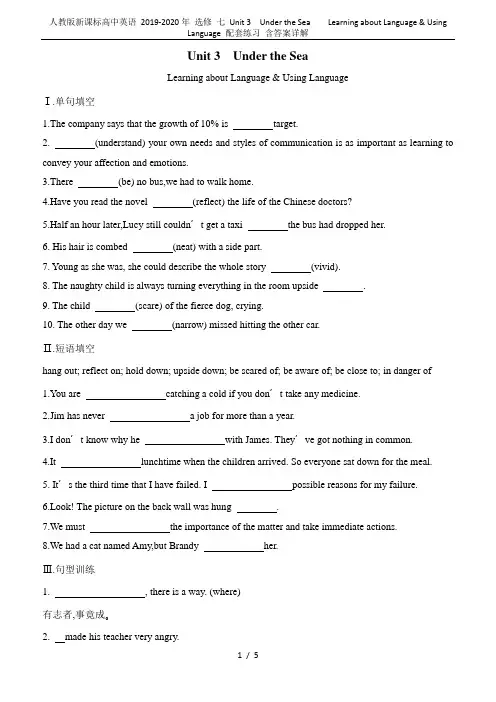
Unit 3Under the SeaLearning about Language & Using LanguageⅠ.单句填空1.The company says that the growth of 10% is target.2. (understand) your own needs and styles of communication is as important as learning to convey your affection and emotions.3.There (be) no bus,we had to walk home.4.Have you read the novel (reflect) the life of the Chinese doctors?5.Half an hour later,Lucy still couldn’t get a taxi the bus had dropped her.6. His hair is combed (neat) with a side part.7. Young as she was, she could describe the whole story (vivid).8. The naughty child is always turning everything in the room upside .9. The child (scare) of the fierce dog, crying.10. The other day we (narrow) missed hitting the other car.Ⅱ.短语填空hang out; reflect on; hold down; upside down; be scared of; be aware of; be close to; in danger of1.You are catching a cold if you don’t take any medicine.2.Jim has never a job for more than a year.3.I don’t know why he with James. They’ve got nothing in common.4.It lunchtime when the children arrived. So everyone sat down for the meal.5. It’s the third time that I have failed. I possible reasons for my failure.6.Look! The picture on the back wall was hung .7.We must the importance of the matter and take immediate actions.8.We had a cat named Amy,but Brandy her.Ⅲ.句型训练1. , there is a way. (where)有志者,事竟成。
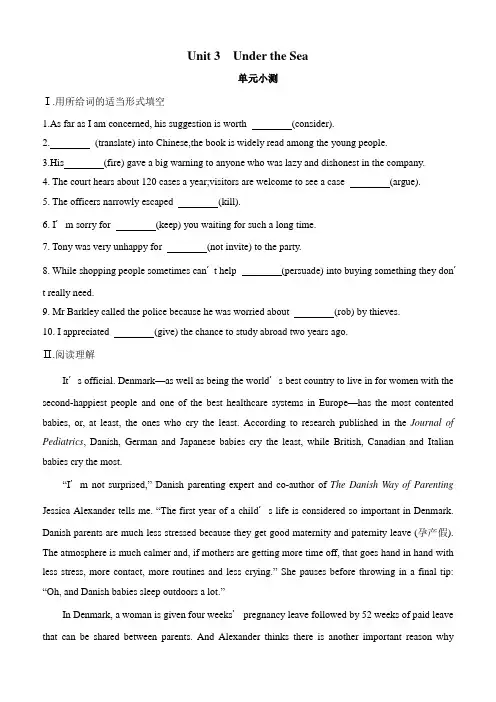
Unit 3Under the Sea单元小测Ⅰ.用所给词的适当形式填空1.As far as I am concerned, his suggestion is worth (consider).2.(translate) into Chinese,the book is widely read among the young people.3.His(fire) gave a big warning to anyone who was lazy and dishonest in the company.4. The court hears about 120 cases a year;visitors are welcome to see a case (argue).5. The officers narrowly escaped (kill).6. I’m sorry for (keep) you waiting for such a long time.7. Tony was very unhappy for (not invite) to the party.8. While shopping people sometimes can’t help (persuade) into buying something they don’t really need.9. Mr Barkley called the police because he was worried about (rob) by thieves.10. I appreciated (give) the chance to study abroad two years ago.Ⅱ.阅读理解It’s official. Denmark—as well as being the world’s best country to live in for women with the second-happiest people and one of the best healthcare systems in Europe—has the most contented babies, or, at least, the ones who cry the least. According to research published in the Journal of Pediatrics, Danish, German and Japanese babies cry the least, while British, Canadian and Italian babies cry the most.“I’m not surprised,” Danish parenting expert and co-author of The Danish Way of Parenting Jessica Alexander tells me. “The first year of a child’s life is considered so important in Denmark. Danish parents are much less stressed because they get good maternity and paternity leave (孕产假). The atmosphere is much calmer and, if mothers are getting more time off, that goes hand in hand with less stress, more contact, more routines and less crying.” She pauses before throwing in a final tip: “Oh, and Danish babies sleep outdoors a lot.”In Denmark, a woman is given four weeks’pregnancy leave followed by 52 weeks of paid leave that can be shared between parents. And Alexander thinks there is another important reason whyDanish babies cry less: breastfeeding. “It’s just the done thing in Denmark,” she says of a country that has the world’s highest breastfeeding rates. “In other countries, there are continual discussions about whether you should or shouldn’t breastfeed. In Denmark, breastfeeding has never gone out of style. And everyone does it for a year.”For Iben Sandahl, Alexander’s co-author, it comes down to the Danish attitude to life in general. “We are an honest and pure people,” she tells me. “We are surrounded by social support and are less likely to become angry, sad or annoyed when our babies are crying. And we are good at embracing (抱) all kinds of feelings, so we aren’t scared. Instead, we try to connect with the babies when they cry. It’s how babies communicate and it’s about trying to understand it.”1. Which of the following can make a baby cry less?A.An effective healthcare system.B.More company from a parent.C.An energetic busy mother.D.More chances to meet fellow babies.2. It can be learned from the text that .A.something in the milk from breastfeeding can keep babies happyB.Denmark is second to none in protecting its females’rightsC.Danish parents’attitudes to a baby’s first year vary considerablyD.breastfeeding is a common and accepted practice in Denmark3. When babies cry, Danish parents will probably .A.try to figure out what they wantB.put them outdoors for a good sleepC.seek social support for guidanceD.wait a moment for them to calm downⅢ.完形填空I was a shy kid. Nothing seemed harder than talking to people. I didn’t even like to answer the phone for fear that I’d have to talk to somebody I didn’t know.1,at school I had to spend all day in the company of others. My 2was studying. It was something I could do 3and by myself. I spent a lot of time studying and was 4with good grades.Eventually I went to college. I came to realize that some people were rather fun to 5with. Yet my childhood 6carried over and I found myself tongue-tied and 7whenever I found myself in a conversation.One day while on campus, I 8an advertisement for a position on the local classical music 9station. I had grown up listening to classical music, and I loved it.In order to get the job, applicants needed to be interviewed. I had absolutely no background in radio, and the idea of talking to thousands of listeners 10me. I didn’t really want the job. I just wanted to prove that I could talk to a(n) 11.Two weeks 12,I was even more terrified to discover that I had actually landed the job.It was a 13job, but I grew to enjoy it. I announced music to thousands of 14in the city, sometimes answering their calls and 15to their requests. I began to feel comfortable talking to these people, these strangers who I couldn’t even 16.Although I now spend much time talking with people, I’m still basically a 17person. My former shyness is a gift, as I can 18people who feel discomfort when they talk to strangers. I still enjoy moments of being 19. But I’m also glad I decided to make a 20in my life that had opened many doors and opportunities that I never knew existed.1.A.However B.Therefore C.Otherwise D.Besides2.A.advice B.practice C.task D.escape3.A.obviously B.simply C.quietly D.poorly4.A.filled B.rewarded C.decorated D.faced5.A.help out B.catch up C.put up D.hang out6.A.happiness B.shyness C.kindness D.goodness7.A.excited B.astonished C.embarrassed D.interested8.A.noticed B.posted C.realized D.believed9.A.fire B.gas D.radio10.A.terrified B.pleased C.satisfied D.amazed11.A.child B.singer C.interviewer D.applicant12.A.ago ter C.before D.since13.A.well-paid B.puzzling fortable D.challenging14.A.listeners B.followers C.viewers D.dancers15.A.referring B.responding C.offering paring16.A.feel B.move C.hear D.see17.A.busy B.warm C.quiet D.smart18.A.look into B.relate to bine with D.worry with19.A.alone B.alive C.active D.awake20.A.plan B.mistake C.change D.dreamⅣ.语法填空阅读下面材料,在空白处填入适当的内容(1个单词)或括号内单词的正确形式。
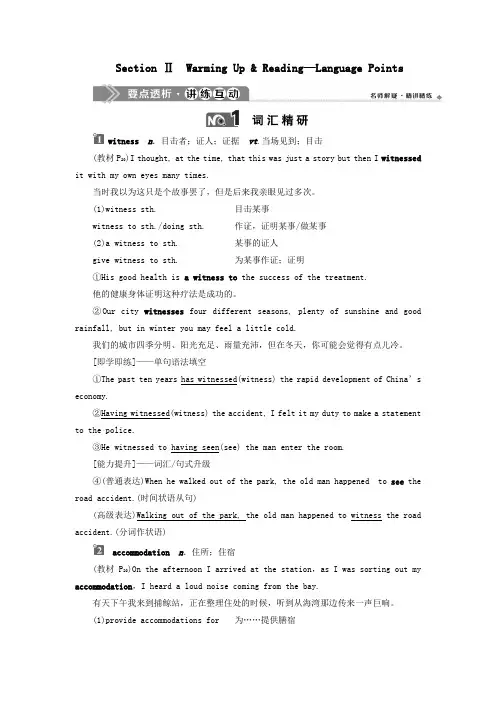
Section ⅡWarming Up & Reading—Language Pointswitness n.目击者;证人;证据vt.当场见到;目击(教材P20)I thought, at the time, that this was just a story but then I witnessed it with my own eyes many times.当时我以为这只是个故事罢了,但是后来我亲眼见过多次。
(1)witness sth. 目击某事witness to sth./doing sth. 作证,证明某事/做某事(2)a witness to sth. 某事的证人give witness to sth. 为某事作证;证明①His good health is a witness to the success of the treatment.他的健康身体证明这种疗法是成功的。
②Our city witnesses four different seasons, plenty of sunshine and good rainfall, but in winter you may feel a little cold.我们的城市四季分明、阳光充足、雨量充沛,但在冬天,你可能会觉得有点儿冷。
[即学即练]——单句语法填空①The past ten years has witnessed(witness) the rapid development of China’s economy.②Having witnessed(witness) the accident, I felt it my duty to make a statement to the police.③He witnessed to having seen(see) the man enter the room.[能力提升]——词汇/句式升级④(普通表达)When he walked out of the park, the old man happened to see the road accident.(时间状语从句)(高级表达)Walking out of the park, the old man happened to witness the road accident.(分词作状语)accommodation n.住所;住宿(教材P20)On the afternoon I arrived at the station,as I was sorting out my accommodation,I heard a loud noise coming from the bay.有天下午我来到捕鲸站,正在整理住处的时候,听到从海湾那边传来一声巨响。
Unit 3 Under the sea【导读】《白鲸》(Moby Dick)是19世纪美国最著名的小说家之一赫尔曼·梅尔维尔于1851年发表的一篇海洋题材的小说,小说描写了亚哈船长为了追逐并杀死白鲸莫比·迪克,最终与白鲸同归于尽的故事。
阅读下面选取的有关捕鲸的节选,对比中外文化中对鲸鱼态度的异同。
Moby Dick (excerpt)PitchpolingTo make them run easily and swiftly,the axles of carriages are anointed;and for much the same purpose,some whalers perform a similar operation upon their boat;they grease the bottom.Nor is it to be doubted that as such a procedure can do no harm,it may possibly be of no contemptible advantage;considering that oil and water are hostile;that oil is a sliding thing,and that the object in view is to make the boat slide bravely.Queequeg believed strongly in anointing his boat,and one morning not long after the German ship Jungfrau disappeared,took more than customary pains in that occupation;crawling under its bottom,where it hung over the side,and rubbing as though diligently seeking to insure a crop of hair from the craft's bald keel.He seemed to be working in obedience to some particular presentiment.Nor did it remain unwarranted by the event.Towards noon whales were raised;but so soon as the ship sailed down to them,they turned and fled swiftly.Nevertheless,the boats pursued,and Stubb's was foremost.By great effort,Tashtego at last succeeded in planting one iron;but the stricken whale,without at all sounding,still continued his horizontal flight,with added speed.Such unintermitted strainings upon the planted iron must sooner or later inevitably extract it.It became imperative to lance the flying whale,or be content to lose him.But to haul the boat up to his flank was impossible,he swam so fast and furious.What then remained?Of all the wondrous devices and dexterities,the sleights of hand and countless subtleties,to which the veteran whaleman is so often forced,none exceed that fine manoeuvre with the lance called pitchpoling.Small sword,or broad sword,in all its exercises boasts nothing like it.It is only indispensable with an inveterate running whale;its grand fact and feature is the wonderful distance to which the long lance is accurately darted from a violently rocking,jerking boat,under extreme headway.Steel and wood included,the entire spear is some ten or twelve feet in length;the staff is much slighter than that of the harpoon,and also of a lighter material —pine.It is furnished with a small rope called a warp,of considerable length,by which it can be hauled back to the hand after darting.But before going further,it is important to mention here,that though the harpoon may be pitchpoled in the same way with the lance,yet it is seldom done;and when done,is still less frequently successful,on account of the greater weight and inferior length of the harpoon as compared with the lance,which in effect become serious drawbacks.As a general thing,therefore,you must first get fast to a whale,before any pitchpoling comes into play.Look now at Stubb;a man who from his humorous,deliberate coolness and equanimity in the direst emergencies,was specially qualified to excel in pitchpoling.Look at him;he stands upright in the tossed bow of the flying boat;wrapt in fleecy foam,the towing whale is forty feet ahead.Handling the long lance lightly,glancing twice or thrice along its length to see if it be exactly straight,Stubb whistlingly gathers up the coil of the warp in one hand,so as to secure its free end in his grasp,leaving the rest unobstructed.Then holding the lance full before his waistband's middle,he levels it at the whale;when,covering him with it,he steadily depresses the buttend in his hand,thereby elevating the point till the weapon stands fairly balanced upon his palm,fifteen feet in the air.He minds you somewhat of a juggler,balancing a long staff on his chin.Next moment with a rapid,nameless impulse,in a superb lofty arch the bright steel spans the foaming distance,and quivers in the life spot of the whale.Instead of sparkling water,he now spouts red blood.That drove the spigot out of him!cried Stubb.“It's July's immortal Fourth;all fountains must run wine today!Would now,it were old Orleans whiskey,or old Ohio!Then,Tashtego,lad,I'd have ye hold a can to the jet,and we'd drink round it!”Again and again to such gamesome talk,the dexterous dart is repeated,the spear returning to its master like a greyhound held in skilful leash.The agonized whale goes into his flurry;the towline is slackened,and the pitchpoler dropping astern,folds his hands,and mutely watches the monster die.《白鲸》(节选)投杆为了使车轴转得又滑又快,就得给车厢的车轴加油;有些捕鲸人为了一样的目的,也对他们的小艇使用类似的办法;他们给艇底擦油。
Section ⅣUsing Language(教师用书独具)A NEW DIMENSION(方面;维(数)) OF LIFE19th JanuaryI'm sitting in the warm night air with a cold drink in my hand and reflecting(思考) on the day- a day of pure(纯粹的) magic! I went snorkelling① on the reef offshore this morning and it was the most fantastic thing I have ever done. Seeing such extraordinary beauty②, I think every cell(细胞) in my body woke up. It was like discovering a whole new dimension of life.崭新的生活空间1月19日我正坐在温暖的夜空下,手捧一杯冷饮,回忆着当天的事情——这是纯粹的神奇的一天!这天上午,我戴着呼吸器在近海的珊瑚礁潜泳,这是我曾有过的最好的经历。
看到这样奇特的美景,我觉得周身的每个细胞都苏醒了。
就像发现了一个崭新的生活空间似的。
The first thing I became aware of③ was all the vivid(鲜艳的) colours surrounding ④ me — purples, reds, oranges, yellows, blues and greens. The corals were fantastic —they were shaped like fans, plates, brains, lace, mushrooms, the branches of trees and the horns of deer. And all kinds of small, neat and elegant fish were swimming in and around the corals.我首先注意到的是我周围那些鲜艳的色彩——紫色、红色、橘黄、明黄、蓝色和绿色等。
2019-2020年高中英语 Unit3 Under the sea Period 3优秀教案新人教版选修7Teaching aims1.To learn the useful expressions and sentence structures in the reading.2.To enable students to use language points both orally and in written forms.3.To further understand the friendship between man and whales.Teaching proceduresStep 1Learning words and phrases1.witness vt.(1)be present at(someplace)and see it 当场见到/目击Did anyone witness the accident?有人亲眼看到那次事故了吗?(2)“见证了”,时间、地点等作主语。
Recent years have witnessed the collapse of the steel industry.近年来钢铁业日渐衰落。
n.[C]目击者,证人The police found the witness to the murder case.警察找到了那件谋杀案的目击者。
There was no witness at the scene of the accident.在事故现场没有证人。
witness 还可表示“作证”“证明”,常用“witness to sth./doing sth.”a live witness to...活生生的证人bear/give witness to sth.为……作证witness-box(英)=witness stand (美)证人席2.sort out(1)分类,整理I am just sorting out the papers that can be thrown away.我在整理可以被扔掉的文件。
(2)解决(问题/困难)We've got a few little problems to sort out.我们有几个小问题要解决。
近义词:sort through 查看并挑选出He was sorting through a pile of papers on his desk.他在整理桌子上的一堆文件。
3.acmodation n.(1)rooms,esp.for living in 房间/住所The high cost of acmodation makes life difficult for students in London.由于住宿费用昂贵,伦敦的学生感到生活困难。
(2)lodgings,rooms and food(often pl.)膳宿(在英国英语中为不可数名词,在美国英语中为可数名词,常用复数)Can we find acmodations at a hotel for tonight?我们今晚能找到旅馆住宿吗?短语:make acmodation for...为……提供膳宿4.yell v.& n.叫喊/叫声,喊声(1)v.shout often because you are frightened,angry,or excitedShe yelled(out)at her naughty child.她朝她那淘气的孩子大喊。
They yelled at him to stop.他们朝他大喊,让他停下来。
(2)n.a loud shout.e.g.a yell of delight/warning5.ahead of(1)(时间、空间上)在……之前(2)领先,比……强、好6.head 朝……方向移动;带领We headed the boat out to sea.我们将船驶向外海。
They are heading home. 他们正朝家走去。
Who is heading the Party?该党现在由谁在领导?Whose name heads the list?谁的名字列在名单的最前头?head for=leave for/start for 朝……方向走去7.flee(fled,fled)vi./vt. 逃走,逃掉,消失And those others are stopping it diving or fleeing out to sea...其他的虎鲸阻止它潜水逃入大海……The spectators fled in panic when the bull got loose.那只公牛挣脱了束缚,吓得观众四下逃窜。
We were forced to flee to the country.我们被迫逃往国外。
8.aim.v.aim(sth.)at sb./sth.瞄准,对准aim at doing sth./aim to do sth.力求达到,力争做到n.[U]瞄准 [C]目的,目标9.drag v.(1)拖,拉,拽He dragged the table into the corner.他把桌子拖到角落里。
(2)勉强某人做He hates parties,and we have to drag him into going.他讨厌参加聚会,我们得硬拉着他去。
If he fails,he'll drag us all down with him.如果他失败了,他会把我们大家一起拖下水。
10.depth n. ……的深度,深……的地方...its body was dragged swiftly by the killers down into the depths of the sea. 它的尸体被虎鲸们迅速拖向深海中去了。
Plant the beans_at_a_depth_of_about six inches.把种子埋到大概六英尺深的地下。
短语: in depth 深入地,彻底地[拓展]the depths of the jungle 丛林深处the depths of the country 穷乡僻壤the depths of the winter 隆冬the depths of one's heart 心灵的深处the depths of despair 绝望的深渊11.have a good feed on...饱餐一顿feed:n.meals or food for babies or animals 餐、顿。
如:When is the baby's next feed?下一次要什么时候喂这个婴儿?v.give food to 喂养feed sb./sth.on sth.=feed sth.to sb./sth. 喂……吃……feed on 以……为食(一般指动物)近义词 live onThe prison is required to feed and clothe the prisoners.监狱被要求向犯人提供食物和衣服。
Several children were feeding bread to the ducks.=Several children were feeding ducks on bread.几个孩子正在喂鸭子吃面包。
Owls feed on mice and other small animals.猫头鹰以老鼠和其他小动物为食。
12.From James's face,I could see he was terrified of being abandoned by us.从詹姆斯的脸上,我能看出他非常恐慌,生怕被我们遗弃。
He abandoned his wife and children.他抛弃了他的妻子和孩子。
此处abandon的意思是“放弃,抛弃”,相关短语有:(1)背弃祖国/朋友:abandon one's country/friend(2)抛弃家庭:abandon one's family(3)革除陋习:abandon a bad habit(4)放弃职位/希望/计划/主意:abandon one's post/hope/plan/idea13.help out帮助……(摆脱困境或危险)My mother helped me out(with some money)when I lost my job.我的母亲在我失业的时候给我金钱上的援助帮我摆脱了困境。
The children help out in their father's shop when things are busy.父亲店里忙的时候,孩子们在店里帮忙。
14.approachvi.& vt. 接近,靠近n.接近,道路,方式,方法15.hold up(1)支撑,举起(2)延迟,阻碍Step 2Using words and phrases1.Do Exercises 1 and 2 on Page 63 in Using Words and Expressions.2.Translate the following sentences into English,using the words and expressions given in brackets.(1)当我意识到她在场之时前,她正好走到我身边。
(be aware of)(2)凯莉每读一本书都喜欢反思一下书的含义。
(reflect on)(3)这场演出没有什么可以挑剔的,这是真正的享受。
(pure)(4)你刷那面墙,同时我准备好这一面墙你好接着刷。
(in the meantime)(5)我的女儿喜欢把自己倒吊在操场的机械上。
(upside down)(6)夜里一些奇怪的声音把我吓得半死。
(scare to death)Suggested answers:(1)She was standing right next to me before I became aware of her presence.(2)Whenever Kelly reads a book,she likes to reflect on its meaning for a while.(3)There was nothing I didn't like about the performance.It was pure enjoyment.(4)You paint that wall and,in the meantime,I will prepare this one for you to paint next.(5)My daughter loves to hang upside down on the playground equipment.(6)The strange noises in the night scared me to death.Step 3ConsolidationAsk students to retell the text after learning the useful words and phrases.Step 4Homework1.Finish off Exercises 1 and 2 on Page 22 in Learning about Language.2.Go over the useful words and phrases in the text.2019-2020年高中英语 Unit3 Under the sea Period 4优秀教案新人教版选修7Teaching aims1.Students will be able to recognize the -ing/being done forms and know the exact meanings of them.2.Students will be able to use these two forms correctly.Teaching proceduresStep 1RevisionAsk students to answer the following questions without referring to the textbook.1.What did Clancy witness when he ran down to the shore?2.Why did Clancy run in a hurry?3.What did Old Tom do when they headed into the bay?4.What did Old Tom do after George beat the water?5.What did Clancy witness when they drew near?Suggested answers:1.He saw a whale throwing itself out of the water and then crashing_down again.2.Because Clancy had already heard that George didn't like being_kept_waiting.3.They could see Old Tom swimming by the boat,showing them the way.4.Tom circled back to the boat,leading them to the hunt again.5.He could see a whale being_attacked by a pack of about six other killers.Next,ask students to pay attention to the underlined words and lead into the grammar item—“v.-ing”/“being done”.Step 2Grammar learning1.现在分词(-ing 形式)的构成。